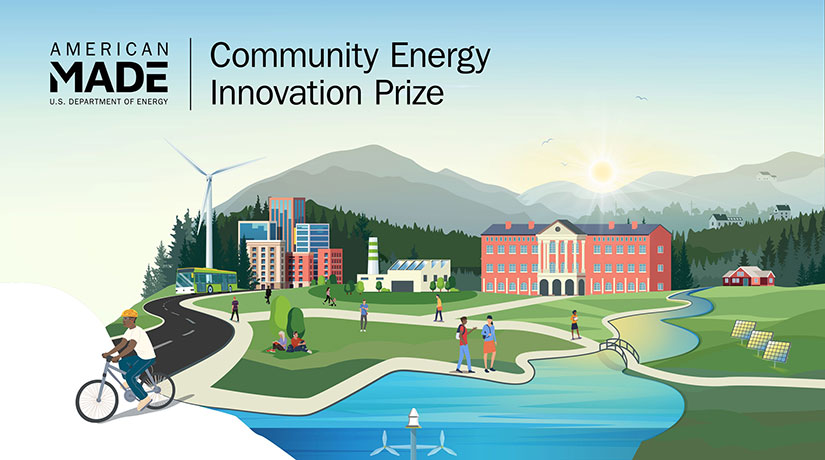Collegiate Students Connect Community and Curriculum To Accelerate Equitable Clean Energy
Five Teams Win CONCEPT Phase of Community Energy Innovation Prize
In one track of the $7.49 million Community Energy Innovation Prize, collegiate teams
are being rewarded for clean energy projects that bring the benefits of clean energy
to underserved communities. Illustration by Tara Smith, NREL
Read the Spanish version of this story.
College students have big ideas. And a few of those big ideas—focused on extending the benefits of clean energy to underserved communities—were just rewarded.
On Dec. 4, 2023, the U.S. Department of Energy (DOE) announced the five winners of the CONCEPT Phase for the Collegiate Track of the American-Made Community Energy Innovation Prize. The academic institutions associated with the winning teams were each awarded $15,000, and the teams will receive in-kind mentorship services throughout the PROGRESS Phase of the prize.
The Community Energy Innovation Prize, which is administered by the National Renewable Energy Laboratory (NREL), was designed to provide funding for activities related to climate and clean energy that support, build trust, and strengthen relationships and partnerships with underserved communities. Prize competitors can participate in one of three tracks: the Collegiate Track, Clean Energy Ecosystem Track, or Manufacturing Ecosystem Track.
In this first phase of the Collegiate Track, student-led teams, in conjunction with a community partner, proposed plans aimed at supporting student education on clean-energy issues while developing projects that benefit underserved communities.
"The Collegiate Track of this prize tackles two big challenges in the clean energy transition: educating the next generation of climate leaders and providing clean energy tools to communities in need,” said Julie Baker, deputy laboratory director and chief operating officer of NREL. “The prize will also help make important connections between students and their communities and establish relationships that will live beyond the prize."
The winning teams moving on to the PROGRESS Phase are:
- American Institute of Chemical Engineering and Lamar University, Beaumont, Texas
Researching the capabilities of converting landfill gas to renewable natural gas and implementing findings into university and underserved-community-based curricula. - Greener CASA, Tyler, Texas
Creating an academia-community partnership to bring free energy audits to underserved communities to promote energy efficiency. - GreenSynergy, Houston, Texas
Integrating clean energy into education by using solar panels, fuel cells, and other technologies to foster learning and sustainability. - Rural Stormwater Recovery Innovators, Cedar City, Utah
Using smart stormwater mitigation strategies to protect community assets and produce and support cleaner water and clean energy. - Solar Decathlon at Georgia Tech, Atlanta, Georgia
Designing and building sustainable net-zero homes to address energy challenges, develop a green workforce, and train the next generation of sustainable professionals in Westside Atlanta.
These teams will now work to implement their planned community activities in the PROGRESS Phase. Teams will report on their activities in March 2024, where the teams’ community partners will receive a $20,000 cash prize and in-kind support services for demonstrating progress on their project. The teams will then move on to the IMPACT Phase where they will have a chance to present their project’s impact at a final event in May 2024 and compete for a share of the GRAND PRIZE pool of up to $100,000.
Follow the Community Energy Innovation Prize to learn more about the Collegiate Track teams’ activities and the progress of teams in the Clean Energy Ecosystem and Manufacturing Ecosystem Tracks. For other prize news, visit the American-Made program and subscribe to the American-Made newsletter.
